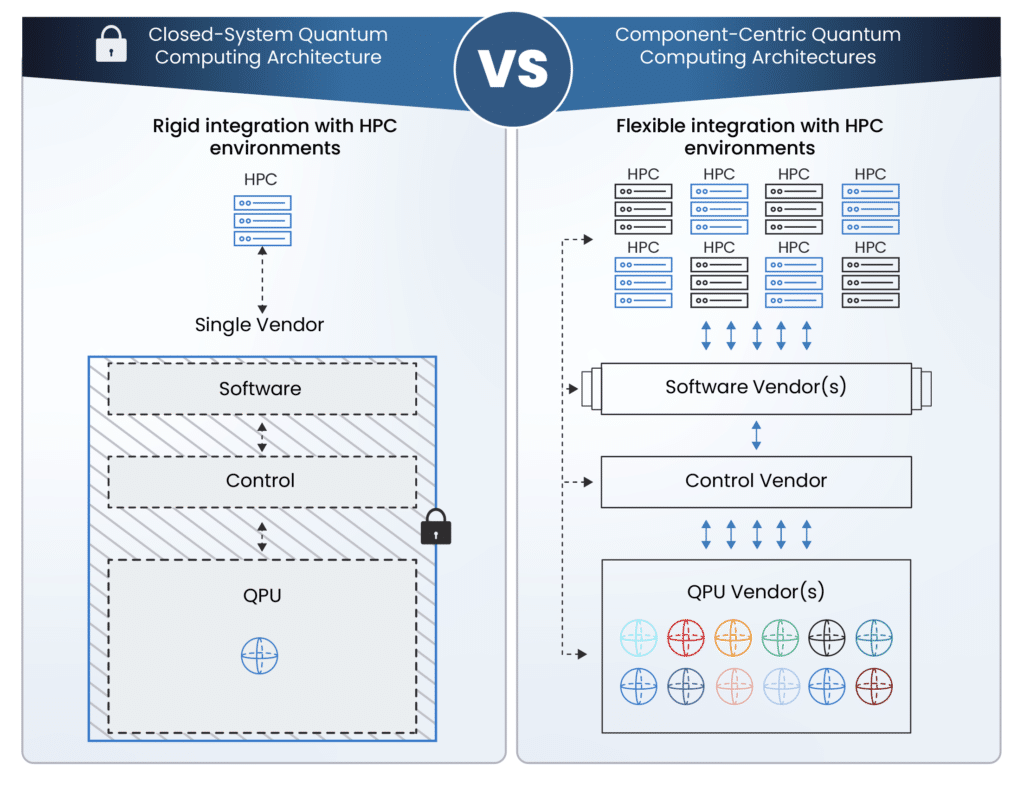Quantum Computing for HPC is Coming. Don’t Let Vendor Silos Screw it Up
Written by Earon Rein and Gilad Ben Shach.
Quantum computing is poised to revolutionize the world of high-performance computing (HPC) by delivering exponential processing power. Despite its potential, the path toward a fully integrated quantum-HPC ecosystem remains somewhat unclear due to technical, business, and systems integration hurdles. These non-technical hurdles are as critical as the technical challenges in practical quantum computing and must be addressed in order to achieve quantum-HPC integration.
Quantum Computing and HPC
Contrary to popular belief, quantum computers will not replace classical supercomputers. Instead, the two will work in tandem to achieve optimal performance. To leverage the strengths of both classical HPC and quantum computers, it is imperative that they are integrated at the level of the control systems, which sit between the qubits and the classical processors. Classical tools and resources are essential for controlling quantum computers as they manipulate quantum states, correct for errors, and perform other critical tasks. Quantum Processing Units (QPUs) are a novel type of processor that can be added to an HPC center’s toolkit. Therefore, in the future, every HPC center will provide access to QPUs, much like they provide access to GPUs and CPUs today.
Challenges to Quantum-HPC Integration
Integrating quantum and HPC systems would be easier if quantum hardware were standardized and HPC systems could connect to it uniformly. However, that is not currently the case. The array of qubit types available makes it unclear which one will become the default once quantum technology matures or if there will even be a single default. Although every expert has their own prediction, the race is not yet decided, and it is too early to pick a winner. A tie, in which several qubit types coexist, is also possible. Additionally, even if a qubit technology emerges as the winner, each QPU vendor within that space has its own software stack, control electronics, and unique features.
This presents a challenge for teams integrating quantum into HPC platforms, as they risk building integrations that may soon become obsolete if the quantum hardware becomes outdated or they choose to switch to a new QPU vendor. Of course, choosing the wrong hardware could have financial and time implications.
Limitations of a Closed-System Quantum Computing Architecture
While a closed system solution has its advantages, such as tight integration, out-of-the-box readiness, and optimization for a specific type of qubit/technology, there are also some drawbacks to this approach. For example, as these systems are incompatible with multiple technologies, users have less flexibility and are locked into a particular vendor’s solution.
While the closed system approach makes sense from a business perspective, it can create limitations for HPC players. This is because many of these “walled garden” solutions are incompatible with competing technologies, which ultimately hinders quantum research and development from progressing optimally.

Closed-System vs. Component-Centric Architectures
An Alternative Approach: Component-Centric Architectures
The alternative to the “closed system” approach is a component-centric strategy, which enables owners of HPC platforms to select quantum hardware without being tied to a specific vendor. With this approach, quantum computer builders can invest in partnerships with individual component makers, providing them flexibility and the ability to change direction without any repercussions.
By adopting a component-centric strategy, vendors only need to choose the best technology for each layer of the stack, giving system integrators more power since everything below the control layer is replaceable. This is the approach we at Quantum Machines aim to enable. We build classical control systems that are effectively qubit agnostic, allowing HPCs to use flexible quantum technology as an access point and real-time scheduler between nodes in their HPC environments.
Quantum Machines’ solutions are designed to support multiple qubit types and are standards-friendly, providing HPC players with the freedom to try QPUs from different vendors and explore competing solutions. This gives HPCs total control over high-level software and calibration tools without being tied to a specific vendor or quantum technology. Ultimately, this approach gives the power back to the developer, allowing them to harness their chosen technology and provide greater levels of flexibility.
While the quantum computing future is inevitable, how we get there is still to be determined. Choosing an open, component-centric approach is the best way for HPCs to expedite the process. If you would like to learn more about our quantum control technology and how it can benefit HPC, please read our whitepaper, “Quantum Acceleration: The Next Level of HPC Performance.”